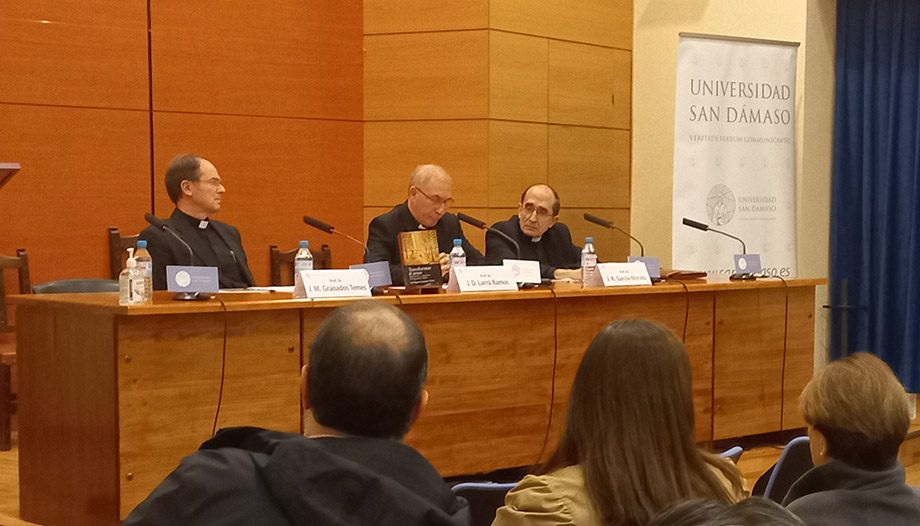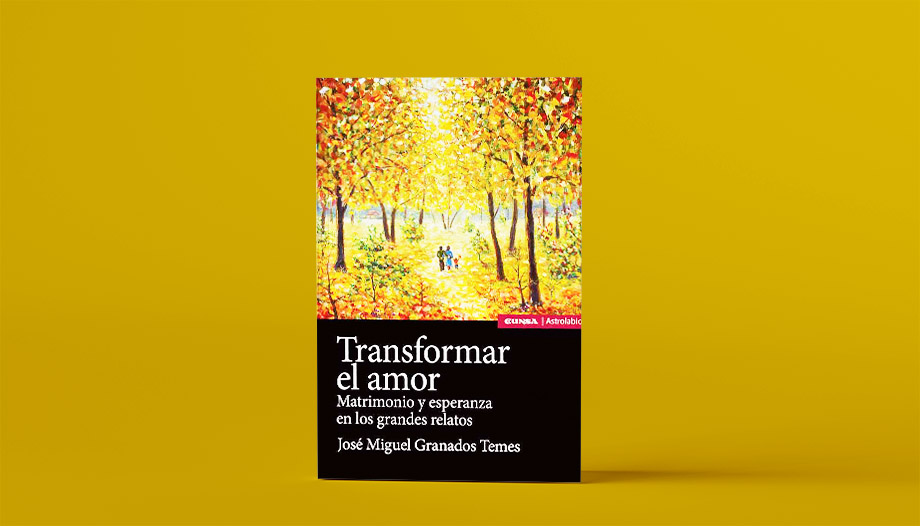There, in the traditional and also university Madrid, accompanied by the vice-dean of the Faculty of Theology, Juan de Dios Larrú Ramos, who presided over the event, and by the rector of the Basilica of San Miguel, Juan Ramón García-Morato, theologian and doctor, José Miguel Granados Temes, who adds to his pastoral work in the diocese of Madrid, an intense research work on marriage and the family, presented to a large audience his latest book, 'Transformar el amor. Marriage and hope in the great stories', edited by Eunsa.
José Miguel Granados has already published in the San Dámaso University her doctoral thesis on 'The Spousal Ethics of John Paul II', defended years ago at the Lateran University in Rome. Her last two works have been 'The Gospel of marriage and the family', and a reflection on human and family values in Anglo-Saxon authors, entitled 'Woman, help me to love'.
Granados Temes' speech included a parade of universally known authors, and others not so well known. As if it were "a visit to a literary art exhibition," he said. "We enter the fairgrounds of the great stories that reflect human life and history. And we do so with the gaze or perspective of the gospel of marriage and the family. We could say that this is a visit to an exhibition that we could title 'the ages of marriage,' discovered in great stories."
Domestic virtues, family values
Because "as we enter into the literary exposition contained in this book, we discover in these captivating accounts of human stories and relationships, on the one hand, a bouquet of beautiful domestic virtuesThe author added: "We are proud of the fact that we have been able to develop our own values, such as patience, forgiveness, humility, courage, fortitude, perseverance, trust, joy and industriousness.
And "on the other hand, we will be surprised to find important family values"He continued, "such as the task of forming a home, a place of welcome for each person, of care for the weak and needy, a place of shelter and support, of promotion and encouragement, of human and Christian formation; or the gaze of tenderness towards others, with sincere affection, life in common, service generously rendered, shared joy".
But above all, José Miguel Granados emphasized, "we will consider fundamental aspects and dimensions of the identitythe vocation and the mission of marriage. Thus, procreation as a sublime form of the fecundity of love, in receiving the incomparable gift of each child; the dignity of the woman, wife and mother, the specific mission of the father; education as an extension of fatherhood and motherhood; affective maturation; the protagonism of the family in social transformation to build a civilization of life and love".
They teach how to live
Some of the authors and stories that we find in the fairgrounds described by Granados are, among others, J.R.R.Tolkien, "with his impressive mythological recreation of admirable anthropological depth", which takes us "to a cosmos full of beauty and dramatic tension between the forces of good and evil", in the words of the author; his friend and university colleague C. S. Lewis, with his "beautiful allegory of the history of salvation" and the lesson of the boy Eustace, in 'The Chronicles of Narnia'; memorable characters of the brilliant Charles Dickens, whom we will quote at the end in his 'Bleak House'; Elizabeth Gaskell and her very strong social denunciation; Oscar Wilde and The Portrait of Dorian Grey; Jane Austen's novels ('Sense and Sensibility', 'Pride and Prejudice'); mystery and suspense stories like those of Anna Katharine Green, or ghostly ones, like those of Wilkie Collins; adventures, like those of Jules Verne; or solitude, like that of Robinson Crusoe (Daniel Defoe).
It is also possible to observe the double moral life in Robert Louis Stevenson's 'Doctor Jekyll and Mr. Hyde'; children's stories by Danish Hans Christian Andersen, like 'The Snow Queen', or Edith Nesbit ('Five Children and That'); the detective novel, with masters of suspense and crime investigation, like Sir Arthur Conan Doyle, Agatha Christie, Mary Elizabeth Braddon, Fergus Hume, Austen Freeman or Nicholas Carter; the brilliant G. K. Chesterton in the human wisdom of Father Brown; or "sagas of American novelists with Christian family values and admirable female figures, who also teach us to appreciate the gift of children".
Russian, French, English...
The author does not forget the great European playwrights of the 19th century either, such as "the profound Russian writer Fyodor Dostoyevsky, a modern giant of the Christian spirit, who makes us think of the moral conscience asleep and awakened by love, with the story of the young anarchist Raskolnikov in Crime and Punishment"; the French writer Victor Hugo, who "transmits, in the great story Les Miserables, the Christian meaning of life and of unjust suffering, overcome with mercy"; the also French Alexandre Dumas, who delights us with the misfortunes and the epic of Edmund Dantes in 'The Count of Monte Cristo', with the need to overcome rancor through Christian forgiveness".
Finally, he cites English novelists of the early 10th century who "show the power of grace in situations of moral ruin", such as Graham Greene or Evelyn Waugh, in 'Return to Brideshead'., or "the warnings of famous contemporary denouncing dystopias. Like the socio-political diatribe '1984', by George Orwell. Or the anguished prophecy of postmodern totalitarianism in Aldous Huxley's 'Brave New World'".
The reason for the title
Often a book begins with a brief quotation of a phrase from an author that is particularly inspiring for the work being done, explained José Miguel Granados. "In my case, I chose these two concatenated statements from the apostolic exhortation to the young entitled 'Christus vivit'.Pope Francis: "Only what is loved can be saved. Only what is embraced can be transformed".
Hence the title of this work: "Transforming love," he said. "For human love is not something spontaneous and automatic, which works by itself with its own internal dynamics in an inexorable way. It must not be forgotten that our nature is wounded by sin. For this reason, a work of recovery is indispensable. In reality, the human being as a person called to love needs to be transformed with the help of teachers of life and formative communities. Whoever undertakes the task of living and walking together with others towards a goal of transcendence must be educated, matured, improved, in a delicate and laborious process of purification, healing and constant learning".
And the author added that, "as the papal sentence mentioned above insinuates, what most renews and embellishes the heart and one's entire existence is the awareness of being loved personally, in a unique, unconditional and full way. To be truly loved fills one's existence with meaning and motivates one to give the best of oneself in the gift of self, in the gift of oneself to others. Moreover, divine grace comes to the aid of human weakness in a superabundant way. Christ is the redeemer of the heart, who gives us the effective ability to overcome difficulties and live according to our dignity and God's plan. This is what has happened in the lives of the saints.
For this reason, Granados explained, "throughout the book we allude to various Christian spouses and exemplary marriages, whose testimony shows the heroic fulfillment of the conjugal vocation in concrete life".
Hope, the central nerve
As for the subtitle of the book -'Marriage and hope in the great stories'-, "the area considered is marriage as a source of hope in some fictional narratives," said Granados, who then outlined an attractive panorama.
"The covenant of conjugal love is the space willed by God to engender and educate human life, to unfold its virtuality to the full," he concluded. "It is the school of true and beautiful love. It springs from the mutual commitment of man and woman who, rereading the spousal language of the body and heart, commit themselves and give themselves for life to build humanity. The divine promise underlies, precedes and accompanies the mutual promise of the spouses. God's gift, by overcoming human fractures, brings forth the hope of a beautiful, faithful and fruitful home of love, a human participation in the mystery of the Trinitarian family communion of the divine persons.
It is precisely hope that is the central nerve in the brief conclusion of the book, entitled 'From Gift to Engagement'. After recounting the gifts that Galadriel, the wise princess of the elves in the kingdom of Lothlórien, offers when bidding farewell to the community of the ring - we are talking about 'The Lord of the Rings' -, the author points out that "so too, the promise of conjugal love contains a divine seed of fecundity capable of overcoming all trials, to bloom with eternal beauty, which begins already on this earth".
He who loves always wins

Granados mentions in the book "the culture of careThe encyclical, so highly praised by Pope Francis, with the reading of Dickens' last complete novel, 'Our Mutual Friend'"; the encyclical, 'Our Mutual Friend', was published by the Pope. Spe salvi ('In hope we have been saved') by Benedict XVI, and to St. John Paul II, with his Letter to familiesamong other authors. But we must quote a phrase of his when commenting on a novel by Charles Dickens. "We understand that - unlike the mundane parameters of competition and the law of the strongest - in reality, the one who loves always wins, even if he seems defeated. This is the case with several characters in the splendid novel Gloomy house".
Without wanting to make a spoiler, in 'Bleak House' we see, the author comments, "apparent losers, such as Ada Claire who accompanies her husband in the fall, seduced by the false expectation of an inheritance; or the young Esther Summerson, who catches a serious illness by caring for the miserable families of the workers; or Mr. Jarndyce, the young woman's guardian, always patient and willing to help everyone; or Colonel George Runcewell, who risks his business to protect a street child; or Caddy Jellib, who is always patient and willing to lend a hand. Jarndyce, the young girl's guardian, always patient and willing to lend a helping hand to all; or Colonel George Runcewell, who risks his business to protect a street child; or Caddy Jelliby, who manages to contract an honorable marriage and form a decent home after overcoming his dire family circumstances; or, finally, Baron Sir Leicester Deadlock, who overrides his noble pride to save his disgraced wife: all these apparent failures are the ones who save the world in which they live with authentic and discreet gestures of self-sacrificing love."








